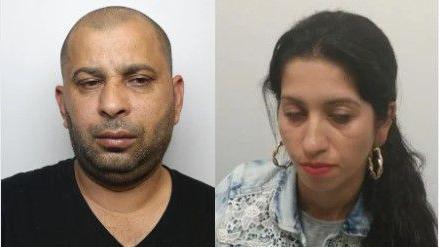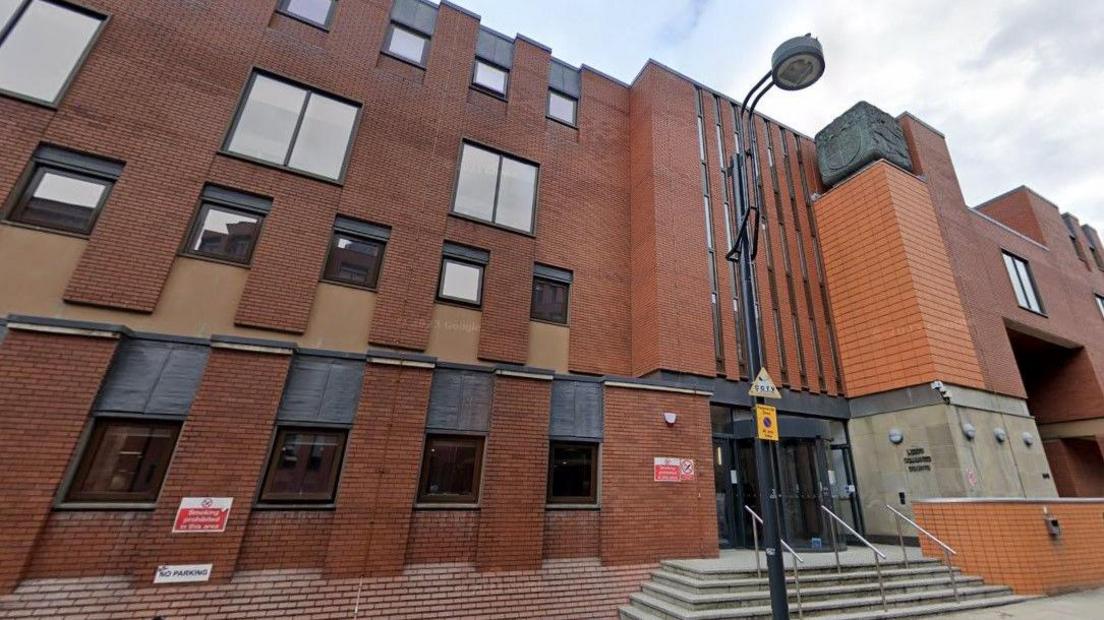Couple jailed over trafficking and prostitution

Costel Tambac (left) and Marianna Iova (right) fled the UK in 2018 while under police investigation
- Published
A couple who trafficked women into the UK and forced them into prostitution before fleeing the country to evade capture have been jailed.
Costel Tambac, 50, and Marianna Iova, 35, had moved the women around England as they exploited them sexually over three months in 2016, a trial at Leeds Crown Court had earlier heard.
At the same court on Friday, Tambac was sentenced to nine years in prison, while Iova, whose violence towards the women was described by His Honour Judge Andrew Stubbs KC as "less significant" than Tambac's, was jailed for eight.
Judge Stubbs said the women had been "effectively held captive" and received "next to no money", while the defendants gained "substantial sums".
The court had heard how a 19-year-old woman living in a small rural town in the Lasi province of Romania was contacted on Facebook in 2016 by a man who told her he could arrange travel to the UK and find work for her.
Prosecutor Conor Quinn told the court that the man "essentially groomed her", adding that the woman had expected to work at a car wash.
'Particularly aggressive'
The trial heard that on a minibus to the UK, the woman had met another from Romania, aged 25, who had already been working as a prostitute in her home country.
The 25-year-old had been recruited by a different man with whom she believed she was in a relationship, Mr Quinn said.
When the women arrived in the UK in August 2016, they were said to have been handed over to Tambac and Iova at an address in Wolverhampton.
Mr Quinn said that upon their arrival at the address, Iova had taken possession of the ID card of one of the victims and had broken her phone.
The women were put to work as prostitutes on the same day.
Mr Quinn said Tambac was "particularly aggressive" towards the women and kicked one of them when he found out she was pregnant.
The court was told the woman saw between six and eight clients a day, with Tambac also driving them to appointments.
"The money paid out for the services was handed straight to the defendants," said Mr Quinn.
The women, who did not speak English, were threatened with violence if they did not follow orders, and Tambac was said to have threatened to rape one of them.
'Intimidated and exploited'
Leeds Crown Court heard that the defendants later trafficked the women around the UK, putting them to work as prostitutes at addresses in the Holbeck and Harehills areas of Leeds, as well as in Dewsbury, Liverpool, Nottingham and Oldham.
Judge Stubbs said they had moved frequently "according to local demand and to stay ahead of the authorities".
Mr Quinn said the addresses were visited by police, "but the defendants controlled what the women told [officers]".
Judge Stubbs later told the court the woman said they were warned their families would be shot if they spoke out against their treatment.
The court heard it was not known how much money was made from the women's exploitation, but £26,000 had been spent advertising their services online.
Mr Quinn said that sum gave "some insight into the levels of profits that these women were being used to generate".
The younger victim remained with the defendants until she escaped, with the help of a client, in November 2016.
The second victim, who had been told she needed to work off a car debt from her partner, remained with Tambac and Iova in the UK until February 2018, and then worked under them again in Spain and Belgium.

Tambac and Iova were sentenced at Leeds Crown Court
The court heard Tambac did not give evidence in his defence at the trial and had sought to blame Iova.
Mitigating on his behalf, Mumin Hashin said one of the women had not mentioned Tambac's violence during a previous trial in Romania.
He said both victims had also had the opportunity to tell police about their experiences when they were spoken to in private by officers.
But Judge Stubbs rejected his pleas for a more lenient sentence, telling him: "It seems to me an unrealistic submission that someone brought from their country, who has no English, who has been repeatedly beaten and controlled in a way these witnesses said they were, should be treated as having the same agency or capabilities as an ordinary member of the public."
"It's simply not how coerced, intimidated and exploited women operate," he said.
Defending Iova, Dhaneshwar Sharma said his client was a sex worker herself who continued to maintain her innocence.
Her ethnic background as a Roma meant it was "all the more difficult" for women from her culture "because they are still treated unfortunately like second-class citizens", he added.
"Given her lack of formal education, some of the behaviour Marianna Iova displayed during this operation is something she doesn't have insight into."
'No insight'
A West Yorkshire Police spokesperson said Tambac and Iova fled the UK in 2018 while they were still under investigation.
The pair were traced to Amsterdam, where they were arrested earlier this year and extradited to the UK, the spokesperson added.
Det Supt Helen Steele said the police's nine-year investigation into the pair was conducted alongside Romanian authorities.
Following a trial in July, both defendants were found guilty of two counts of arranging or facilitating travel of another person with a view to exploitation, and two counts of controlling prostitution for gain.
Tambac was jailed for nine years for counts one and two and given a three-and-a-half year sentence, to be served concurrently, for the second two counts.
Iova was jailed for eight years for counts one and two and handed a three-year concurrent sentence for counts three and four.
Judge Stubbs also made the pair subject to Slavery and Trafficking Prevention orders in the event they were not subsequently deported.
Get in touch
Tell us which stories we should cover in Yorkshire
Listen to highlights from West Yorkshire on BBC Sounds, catch up with the latest episode of Look North.